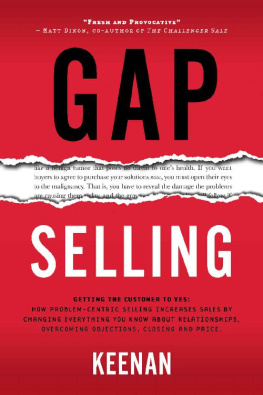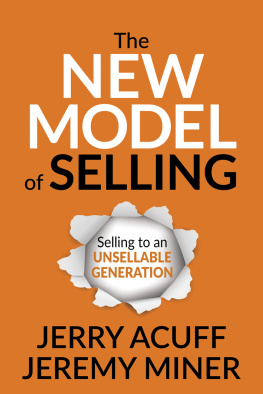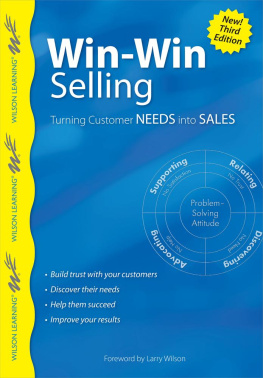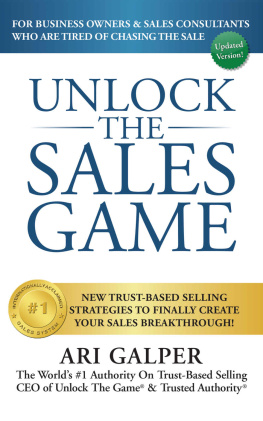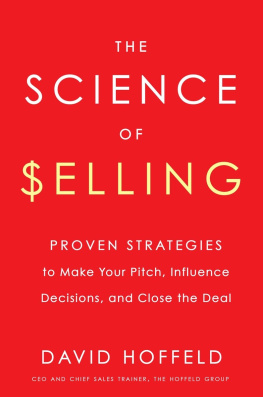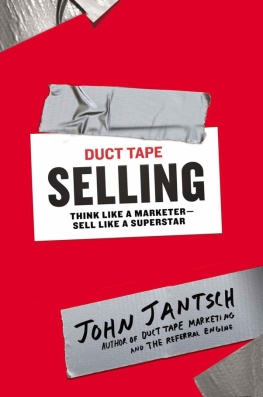To Sales People Everywhere
Hey, salespeople, you guys rock! You are the extreme athletes of the business world. You only get paid if you deliver. You put anywhere from 40% to 100% of your salary on the line in commissions. There are no guarantees, and you shrug off the idea there should be. You suffer rejection and get pummeled with Nos at the hands of rude, terse, and overwhelmed buyers. You spend weeks, months, and years working a deal only to lose it to the competition over a few dollars or an insignificant feature. Youre constantly shadowed by overzealous managers pounding you about quota and the next deal. The life of a salesperson is tough, and yet you come back every day, ready to grind it out, looking to make your buyers and customers lives better.
Its because of my love for you that I created Gap Selling and wrote this book. Gap Selling is about making your life easier. Its about helping you understand that selling isnt as hard as weve been led to believe. Selling shouldnt be fraught with countless lost deals, fruitless price negotiations, prospects going dark, people ignoring your emails, and unpredictable sales pipelines. Its only like that when youre doing it wrong. When youre doing it right, selling is fluid, predictable, and efficient. This book is about helping you get there.
Gap Selling is going to take you on a ride, and for some of you it will be an uncomfortable one. Its going to challenge many of your entrenched beliefs and approaches to selling. Its in direct conflict with what weve been taught to believe for years, like:
- Relationships really don't matter
- People really do buy from people they don't like
- There is no such thing as "closing"
- You should never defend your product or price
- No one gives a shit about you or your product and service
- Pitching is not selling
- Selling to a customer's need is wrong
- and more
Almost all of the issues and challenges within sales are self-induced. We create the reasons the customer goes dark. We create the focus on price. We allow the customer to hold us hostage over an irrelevant feature. We allow the competition to swoop in at the eleventh hour. We create the situations where the buyer chooses to do nothing. We make it easy for prospects to ignore our emails, voicemails, and LinkedIn messages. These failings are almost always our fault because we havent been taught the game of sales. We know the rules, we know the objective, but most of us dont understand the nuances of the game and its costing us and the sales industry billions of dollars a year.
Gap Selling is going to teach you what the game of selling is all about and how to win. Its going to give you the practical advice and executable skills and methods to win more deals, shorten sales cycles, and avoid losing on price. Its going to show you how to get buyers to partner with you and be an integral part of the sale so they no longer go dark, avoid your calls, and put up unnecessary roadblocks.
The book is divided into four parts. Part I is devoted to teaching you the rules of gap selling so you can approach every sale with the right mental framework and psychological insight. Part II will teach you the specific skills and strategies you need to play this game better than everyone else, from the steps of a killer discovery, to conducting a kickass demo, to avoiding pitfalls and diffusing objections. Part III will reveal the surprising ways gap-selling principles can be used to generate more productive prospecting so you can build a bigger, better pipeline faster. And finally, Part IV serves as a guide for sales leaders to build and manage a gap-selling environment, assemble a killer gap-selling team, and never lose another nights sleep worrying about making their numbers.
Weve been playing the game too long without understanding the game weve been playing. You deserve better.
Are you ready to learn the game of sales? Good! Now, consider this the last day to sell the way youre selling. There is a better way.
P A R T I
KNOW THE GAME
Are you ready to learn the secret to the game?
CHAPTER ONE
WELCOME TO THE GAME
It was 0-0. Our opponents were on our 10-yard line. We had stopped them seven plays in a row. It was impressive. We must have had a penalty or something, because as I recall they hadnt gotten a first down. But now it was 4th and goal late in the fourth quarter. All we had to do was hold them for one more play.
The year was 1979, and I was eleven years old. I had never played competitive football before and this was my first season. I didnt watch it on TV. My mom and dad were 60s hippies, not sport enthusiasts, and certainly not football fans. So, my knowledge of the game was pretty much zero.
I was skinny but fast so the coaches figured Id make a great running back. They pulled another kid and me aside and showed us a chalkboard with circles and numbers scrawled all over it. These represented the offensive line and the holes between each lineman. It might as well have been in Chinese. I honestly cant remember if I didnt have much desire to learn or if I found the whole thing too complicated, but the outcome was the same: I didnt pay attention.
In our first scrimmage, the coach put me in at running back. We huddled up and the QB called the play. I had learned enough to understand that the quarterbacks play determined who got the ball and who didnt, but nothing else made any sense to me. So, once the huddle broke, I asked the other running back, Who gets the ball?
You do, he said, giving me a weird look.
Ok. Got it.
When the ball was snapped, I took the handoff and ran. I was tackled within half a second in the backfield for a loss. As I got up, the entire team, including the coach, started yelling at me.
What are you doing, Keenan? Where the hell were you going? The hole is over there! What the hell, Keenan?
I had no idea what they were talking about.
Apparently, what the QB says in the huddle matters. I didnt go to the appropriate hole. I didnt understand the play that was being called. I didnt understand the plays at all. As you can imagine, that single play was the end of my running back days, at least for that year.
I was benched for the rest of the scrimmage. Embarrassed, confused, and frustrated, I swore I would do better next time, if next time ever came.
The next day at practice, the coach put me on defense in the safety position, and he said something Ill never forget: Keenan, just run as fast as you can and tackle the guy with the ball.
I dont know if this coach was the best coach in the world, or if he thought I was the dumbest kid in the world. Regardless, he understood that despite being a talented athlete, I was struggling to understand the game. So, he made the game as simple as possible for me.
Run as fast as you can and tackle the guy with the ball.
That I could do. From then on, I flew around that football field like a Tasmanian devil, tackling whomever dared run the football against our team. It was my job. I loved it, and I was great at it.
Until the day it was 4th and goal, and the quarterback for the opposing team was about to snap the ball.
I was playing safety on the right side of the field, eyeing the quarterback, when he snapped the ball. I watched to see which running back he was going to hand it off to, when all of a sudden everyone started yelling, Pass!
Pass? Huh? No one passed in Pop Warner. Not back then, anyway. We were 11-and- 12-year-olds, for Gods sake.
The quarterback dropped back to pass and I looked up and saw the wide receiver camped just five feet in front of me to my right. The quarterback turned our way and heaved the ball. It was a sorry excuse for a pass, a wobbling duck oscillating from side to side. I was standing right under it, as was the wide receiver. My heart began to pound. I was in the perfect position. I knew I could make this play and make it big. Id timed the whole thing out. I envisioned everyone cheering me after the play ended. A calm came over me as I stepped back two steps, sized up the wide receiver, looked up at the ball, waited for him to catch it and timed my hit perfectly. The second he caught the ball, I lunged with all my weight and strength and tackled him to the ground. I jumped up, psyched about the punishment I had just put on this poor kid. However, as I got up, I realized I was the only one on my team celebrating. The other team, however, was going wild.
Next page
